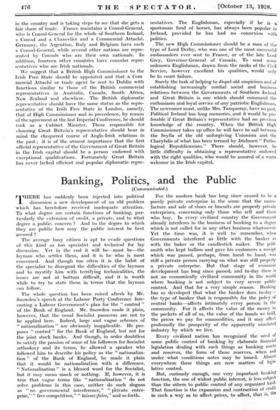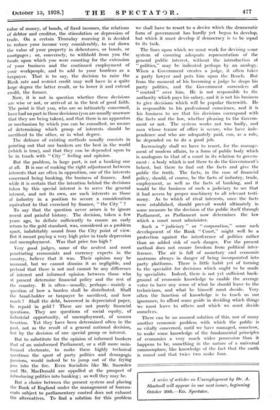Banking, Politics, and the Public (Communicated.) T HERE has suddenly been
injected into political discussion a new • development of an old problem which has heretofore received inadequate attention. To what degree are certain functions of banking, par- ticularly the extension of credit, a private, and to what degree a public, concern ? And to the degree to which they are public how may the public interest be best secured ?
The average busy citizen is apt to evade questions of this kind as too specialist and technical for lay discussion. Yet in the end it will be—must be—the layman who settles them, and it is he who is most concerned. And though too often it is the habit of the specialist to disregard the difficulties of the layman and to mystify him with terrifying technicalities, the issues are, not at bottom difficult, and it is worth while to try to state them in terms that the layman can follow.
The whole question has been raised afresh by Mr. Snowden's speech at the Labour Party Conference fore- casting a Labour Government's plan for the " control " of the Bank of England. Mr. Snowden made it plain, however, that the usual Socialist panaceas are not to be applied here. Indeed, large and vague schemes of " nationalization " are obviously inapplicable. He pro- poses " control " for the Bank of England, but not for the joint stock banks. And though, in order doubtless to satisfy the passion of some of his followers for Socialist orthodoxy and its terms, he allowed a speaker who followed him to describe his policy as the " nationaliza- tion " of the Bank of England, he made it plain that it would be nationalization with a difference. " Nationalization " is a blessed word for the Socialist, but it may mean much or nothing. If, however, it is true that vague terms like " nationalization " do not solve problems in this case, neither do such slogans as " no governmental interference," " Private enter- prise," " free competition," " laissez-faire," and so forth. For the modern bank has long since ceased to be a purely private enterprise in the sense that the manu- facture and sale of shoes or biscuits are properly private enterprises, concerning only those who sell and those who buy. In every civilized country the Government already interferes in the business of banking to a degree which is not called for in any other business whatsoever. Yet the time was, it is well to remember, when Governments interfered as little with the banker as with the baker or the candlestick maker. The gold- smith who kept bullion and gave his customers a receipt which was passed, perhaps, from hand to hand, was still a private person carrying on what was still properly a private enterprise. But that stage of economic development has long since passed, and to-day there is not an economically civilized community in the world where banking is not subject to very severe public control. And that for a very simple reason. Banking has so developed that what the banker does to-day- the type of banker that is responsible for the policy of central banks—affects intimately every person in the community. For it affects the value of the money in the pockets of all of us, the value of the bonds we hold, the prices we pay for commodities, and it may affect profoundly the prosperity of the apparently unrelated industry by which we live.
Every civilized nation has recognized the need of some public control of banking by elaborate financial legislation dealing with such things as banking assets and reserves, the form of those reserves, when and under what conditions notes may be issued. Almost everywhere these things are now matters of legis- lative control.
But, curiously enough, one very important banking function, the one of widest public interest, is less subject than the others to public control of any organized kind. That function is the expansion and contraction of credit in such a way as -to affect prices, to affect, that is, the value of money, of bonds, of fixed incomes, the relations of debtor and creditor, the stimulation or depression of trade. On a certain Thursday morning it is decided to reduce your income very considerably, to cut down the value of your property in debentures, or bonds, or mortgages ; or, conversely, to withhold from you the funds upon which you were counting for the extension of your business and the .continued employment of your workpeople, and to add to your burdens as a taxpayer. That is to say, the decision to raise the Bank rate and restrict credit may well have in a quite large degree the latter result, or to lower it and extend credit, the former.
Now, it is not in question whether these decisions are wise or not, or arrived at in the best of good faith. The point is that you, who are so intimately concerned, have had no part in those decisions (you are usually unaware that they are being taken), and that there is no apparatus or mechanism by which you can be consulted, no means of determining which group of interests should be sacrificed to the other, or in what degree.
The defence of existing methods usually consists in pointing out that our bankers are the best in the world (which is true), and that they can be depended upon to be in touch. with " City " feeling and opinion.
But the problem, in large part, is not a banking one at all. It is one of making the right adjustment between interests that arc often in opposition, one of the interests concerned being banking, the business of finance. And while it is certain that the intention behind the decisions taken by this special interest is to serve the general interest, and not its own, are such interests as those of industry in a position to secure a consideration equivalent to that exercised by finance, " the City " ?
To say that the question never arises is to ignore recent and painful history. The decision, taken a few years ago, to deflate sufficiently to ensure an early return to the gold standard, was, considered as a problem apart, indubitably sound from the City point of view. But it meant paying a very high price in trade depression and unemployment. Was that price too high ?
Very good judges, some of the acutest and most penetrating economists and currency experts in the country, believe that it was. Their opinion may be unsound, but we cannot dismiss it as negligible, and pretend that there is not and cannot be any difference of interest and informed opinion between those who qt present determine financial policy and the rest of the country. It is often—usually, perhaps—mainly a question of how a burden shall be distributed. Shall the bond-holder or taxpayer be sacrificed, and how much ? Shall the debt, borrowed in depreciated paper, be repaid in gold ? These are not purely financial questions. They are questions of social equity, of industrial opportunity, of unemployment, of unseen taxation. Yet they have been determined often in the past, not as the result of a general national decision, but by the decision of one special group or interest.
But to substitute for the opinion of informed bankers that of an uninformed Parliament, or a still more unin- formed electorate, to make these highly technical questions the sport of party politics and demagogic passions, would indeed be to jump out of the frying pan into the fire. Even Socialists like Mr. Snowden and Mr. MacDonald are appalled at the prospect of introducing politics into banking ; as well they may be.
But a choice between the present system and placing the Bank of England under the management of bureau- crats subject to parliamentary control does not exhaust the alternatives. To find a solution for this problem we shall have to resort to a device which the democratic form of government has hardly yet begun to develop, but which it must develop if democracy is to be equal to its task.
The lines upon which we must work for devising some system of ensuring adequate representation of the general public interest, without the introduction of " politics," may be indicated perhaps by an analogy. When a Government creates a judge, it often takes a party lawyer and puts him upon the Bench. But from the moment of his becoming a judge he drops his party politics, and the Government surrenders all "control " over him. He is not responsible to the. authority which pays his salary, and it is not his business to give decisions which will be popular therewith. He is responsible to his professional conscience, and it is his business to see that his decisions correspond with the facts and the law, whether pleasing to the Govern- ment or not. The system works not too badly, and men whose tenure of office is secure, who have inde- pendence and who are adequately paid, can, as a rule, be depended on to do a good job.
Increasingly shall we have to resort, for the manage- ment of modern affairs, to a form of public body which is analogous to that of a court in its relation to govern- ment : a body which is not there to do the Government's behest, but there to find out the facts and give the public the truth. The facts, in the case of financial policy, should, of course, be the facts of industry, trade, employment, as well as the facts of banking, and it would be the business of such a judiciary to see that it had access by proper machinery to all relevant testi- mony. As to which of rival interests, once the facts were established, should prevail would ultimately in some measure be the decision of the public itself through Parliament, as Parliament now determines the law which a court must administer.
Such a " judiciary " or " corporation," some such development of the Bank " Court," might well be a protection against the interference of politics rather than an added risk of such danger. For the present method does not ensure freedom from political inter- ference. The air is full of monetary and economic nostrums always in danger of being incorporated into party platforms. There is little habit yet of turning to the specialist for decisions which ought to be made by specialists. Indeed, there is not yet sufficient back- ground of economic knowledge to enable the average voter to have any sense of what he should leave to the technicians, and what he himself must decide. Very often the function of knowledge is to teach us our ignorance, to afford some guide in deciding which things we must leave to others and which we must decide ourselves.
There can be no assured solution of this, nor of many another economic problem with which the public is so vitally concerned, until we have managed, somehow, to make some knowledge of the fundamental principles of economics a very much wider possession than it happens to be, something in the nature of a universal commonplace, like knowledge of the fact that the earth is round and that twice two make four.









































 Previous page
Previous page